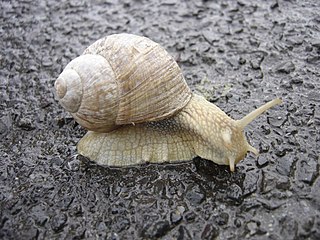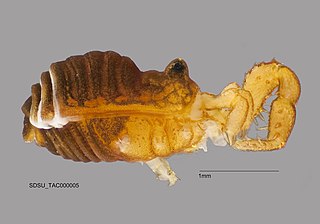
A snail is a shelled gastropod. The name is most often applied to land snails, terrestrial pulmonate gastropod molluscs. However, the common name snail is also used for most of the members of the molluscan class Gastropoda that have a coiled shell that is large enough for the animal to retract completely into. When the word "snail" is used in this most general sense, it includes not just land snails but also numerous species of sea snails and freshwater snails. Gastropods that naturally lack a shell, or have only an internal shell, are mostly called slugs, and land snails that have only a very small shell are often called semi-slugs.

The pygmy rabbit is a rabbit species native to the United States. It is also the only native rabbit species in North America to dig its own burrow. The pygmy rabbit differs significantly from species within either the Lepus (hare) or Sylvilagus (cottontail) genera and is generally considered to be within the monotypic genus Brachylagus. One isolated population, the Columbia Basin pygmy rabbit, is listed as an endangered species by the U.S. Federal government, though the International Union for Conservation of Nature lists the species as lower risk.

Chrysemys is a genus of turtles in the family Emydidae. They are found throughout most of North America.

Sea snail is a common name for slow-moving marine gastropod molluscs, usually with visible external shells, such as whelk or abalone. They share the taxonomic class Gastropoda with slugs, which are distinguished from snails primarily by the absence of a visible shell.
The Coeur d'Alene salamander is a species of woodland salamander (Plethodon) in the family of lungless salamanders (Plethodontidae) found in northern Idaho, western Montana, and southeastern British Columbia. This species was discovered in 1939 by James R. Slater and John W. Slipp on the south shore of Lake Coeur d'Alene in northern Idaho. It was once considered to be a subspecies of Van Dyke's salamander, as P. vandykei idahoensis, but appears to be a distinct and separate species as originally suggested by Slater and Slipp (1940).

The Idaho pocket gopher is a species of rodent in the family Geomyidae. It is rather small, with a lightly built skull. Its fur color varies through the body and between individuals. Found in the western United States, it inhabits savannas, shrubland, and grasslands. Individuals live alone in burrows, staying active year-round. Many aspects of its behavior and biology are not well understood. The species is classified as being of least-concern by the International Union for the Conservation of Nature.

Oreohelix is a genus of air-breathing land snail, a terrestrial pulmonate gastropod mollusk in the family Oreohelicidae.
The Jackson lake springsnail, scientific name Pyrgulopsis robusta, is a species of very small or minute freshwater snail with an operculum, an aquatic gastropod mollusk in the family Hydrobiidae. This species is endemic to the United States. The shell is 4.6 to 7.5 millimetres high and 1.48 to 2.10 millimetres wide, which is large for this genus. It has 4.5 to 6.25 whorls, and is clear-white with a tan periostracum.

Festuca idahoensis is a species of grass known by the common names Idaho fescue and blue bunchgrass. It is native to western North America, where it is widespread and common. It can be found in many ecosystems, from shady forests to open plains grasslands.
The Columbia Basin pygmy rabbit is an isolated population of pygmy rabbit , that is native only to a single Columbia Basin area of Washington state. The Columbia Basin pygmy rabbit is the smallest North American rabbit. While the IUCN considers the species as a whole to be of least concern, the US Fish & Wildlife Service considers this a distinct population segment, and thus merits protections under the Endangered Species Act. The last purebred Columbia Basin pygmy rabbit died in 2008, marking the end of the pure genetic line.

Esslingeriana is a fungal genus in the family Parmeliaceae. The genus is monotypic, containing the single foliose lichen species Esslingeriana idahoensis, commonly known as the tinted rag lichen. It is found in northwestern North America.

Pherbellia is a genus of flies in the family Sciomyzidae, the marsh flies or snail-killing flies. They occur throughout the world, except for the Subantarctic region.
Bryelmis idahoensis is a species of riffle beetle in the family Elmidae. It is found in North America.
Euxoa idahoensis is a species of cutworm or dart moth in the family Noctuidae. It is found in North America.
Dolichopus idahoensis is a species of long-legged fly in the family Dolichopodidae.

Sclerobunus idahoensis is a species of armoured harvestman in the family Paranonychidae. It is found in North America.
Acmaeodera idahoensis is a species of metallic wood-boring beetle in the family Buprestidae. It is found in North America.











